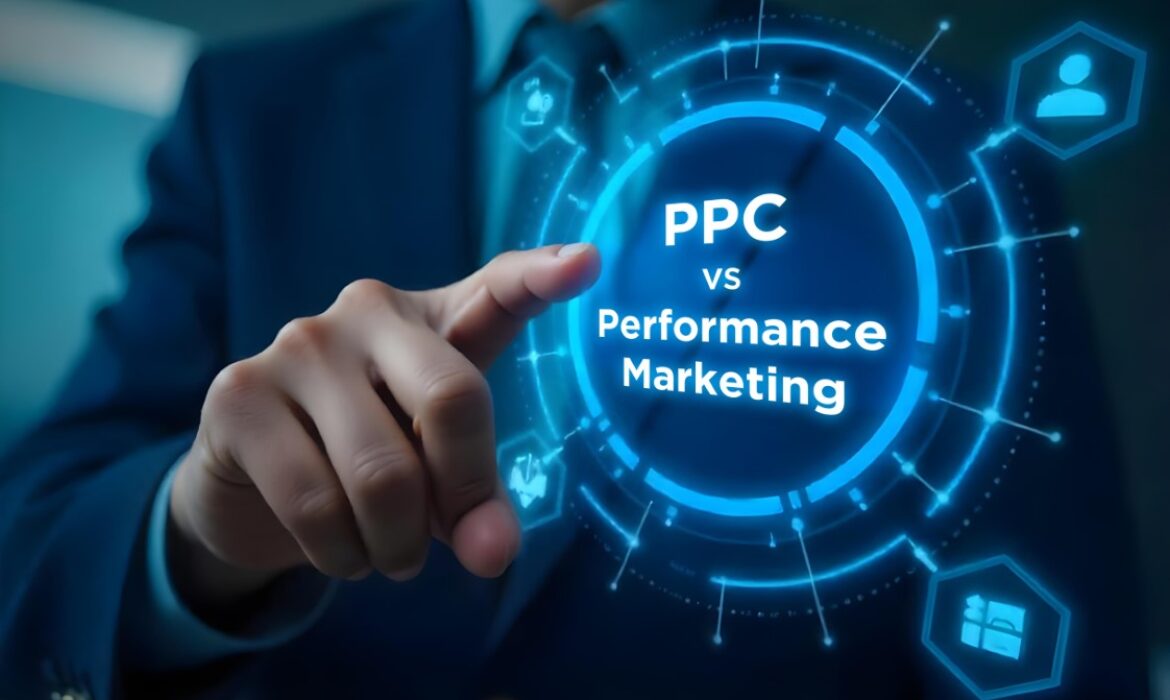
In today’s digital landscape, businesses have two powerhouse strategies: PPC (Pay-Per-Click) and Performance Marketing, two of the most commonly recognised strategies of digital marketing funnel stages. Most digital marketing services use these to achieve targets and boost client’s business. However, what is the difference between these two? Wherein lies their applicability, and more critically, which of them is best suited to your brand’s goals?
This article will help you understand the essentials of PPC and performance marketing, their differences, and when and why to use the option. We will also see how these strategies could be combined for a better and highly effective outcome. Finally, we will explain why the best PPC agency, Ridge Advertising & Marketing Consultants, can be your perfect partner for PPC and performance marketing. These strategies will bring you incredible results that will improve your business.
PPC vs. Performance Marketing, a Comparative Analysis?
PPC and Performance Marketing are effective digital advertising strategies but differ in approach, cost structure, and outcome focus. Here’s a closer look at their main distinctions:
Approach
- PPC: PPC is an advertising strategy in which firms purchase space on Websites, such as Google and social media, to advertise. The advertiser spends money each time a user clicks on the placed ad, which directs potential customers to a particular web page. The degree of targeting is very managed because there is a possibility to set keywords, time, gender, age, etc.; therefore, businesses can draw genuine individuals actively seeking the advertised products/services.
- Performance Marketing: While PPC is part of performance marketing, it is much wider and spans affiliate marketing, social media, influencer marketing, and others. Unlike PPC, which targets a certain number of clicks, performance marketing delivers specific results, including sales, leads, and downloads. This way, flexibility for multiple channels is enabled so that efforts linked to better penetration and conversion can be identified.
Cost Structure
- PPC: There are no fixed fees; it works on a cost-per-click model, and success often depends on bidding. The price, however, may differ considerably, particularly concerning keyword competition and ad relevance. While PPC helps get quick and direct traffic to the site, it is unsuitable for competitive keywords if you have a limited budget.
- Performance Marketing: Unlike traditional advertising, the advertiser only pays for results; hence, payment corresponds to performance. It is usually less expensive since brands are only charged each time a click translates into a conversion instead of a charge per click, thus making it perfect for long-term strategic campaigns.
Results and Outcomes
- PPC: Like any advertising method, PPC is good for an immediate flow of traffic where the target is to gain exposure within a short time, such as during a Ramp-up promotion or festive season. Demand can be targeted effectively as it can deliver results instantly.
- Performance Marketing: Thanks to its focus on completed actions, performance marketing guarantees that brands will receive revenue on their investment budgets. This approach suits the creation and development of leads and is associated with creating long-term customers. Its effects are measurable and connected with a business’s objectives.
While PPC and performance marketing have distinct advantages, a well-rounded strategy often integrates both. Ridge Advertising & Marketing Consultants leverages expertise in each area to create dynamic campaigns that maximise reach and conversions, aligning strategies with your business goals for optimal impact.
Benefits and Use Cases: Choosing the Right Approach
In PPC, the key focus is on reaching the consumer and converting an associated click into a sale, lead, or other kind of interaction, while in performance marketing, the major consideration is the direct return on investment.
PPC Benefits: PPC enables brands to pop up in search results or the news feed when the user is actually searching for particular products or services. This approach is effective when directed at the users with whom the engagement is relevant, for instance, during the launching of a new product, a promotion, or an event.
Performance Marketing Benefits: Performance marketing aims at sustainable development and reasonable amortisation. As payment is made to get specific results, such as sales or subscriptions, it works very well for business organisations that aim to create a customer base of qualified traffic for their products and services. This marketing is perfect for continuous customer acquisition and retention, for which programs directly translate into ROI.
Why Ridge Consultants Excel in Both PPC and Performance Marketing
Ridge Advertising & Marketing Consultants is renowned for its PPC and performance marketing proficiency. It employs a considerate approach customised to get the results its clients want. PPC at Ridge is information-backed and focused targeting that aims to develop contests that attract high-intending individuals to click on links that direct viewers to the client’s site. By continually monitoring and refining keywords, ad placements, and bidding strategies, Ridge ensures that each PPC campaign achieves optimal ROI.
In performance marketing, Ridge’s approach differs from the typical click-through rates since it is conversion-based. Ridge Advertising & Marketing Consultants implements social media and influencers to build strong multiple-channel campaigns that focus on generating a particular CTA of sale, lead, or download. This enables clients to only pay for real results, making performance marketing campaigns efficient and effective.
With a portfolio of successful client campaigns across diverse industries, Ridge’s expertise lies in adapting to client needs and market conditions, crafting customized strategies that not only meet but exceed business objectives.
